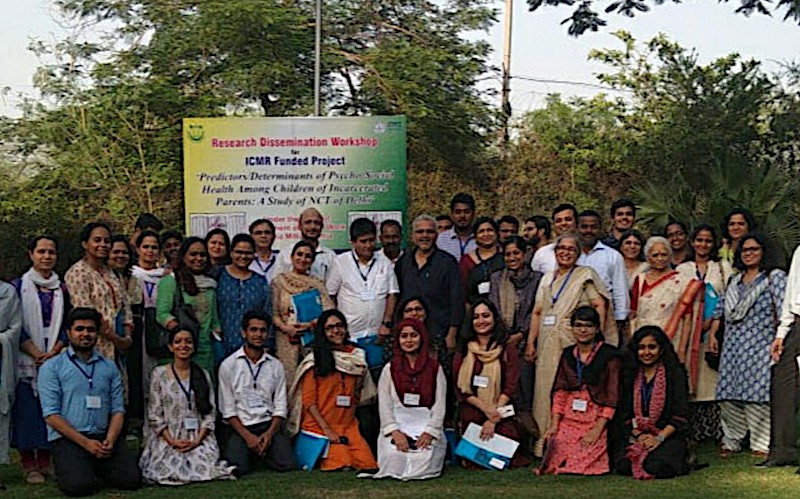BeyondHeadlines News Desk
New Delhi: A study conducted by the Department of Social Work, Jamia Millia Islamia (JMI) on the children of incarcerated parents has revealed that the stigma has made them vulnerable to insensitivity, ridicule and harassment from their relatives, peers and teachers with a few exceptions.
The research study titled ‘Predictors/Determinants of Psycho-social Health among Children of Incarcerated Parents’, conducted during the period of years from June 1, 2017, in NCT of Delhi covered 72 children of incarcerated parents between age group of 6 to 18 years living in the community along with their past and present caregivers. Forty families and members of three civil organizations engaged in dealing with the issue were also interviewed during the course of the research.
The research was conducted by a team, led by Professor Neelam Sukhramani, the Principal Investigator. Dr. Sigamani Panneer, was Co-Principal Investigator. Other team members were Shivangi Gupta, Navnee Gupta and Shahanshah Alam. It was carried out with funding support from the Indian Council of Medical Research (ICMR).
The study revealed that the caregiver families had to incur profound economic and social costs due to the loss of the sole breadwinning family member due to incarceration as well as their entanglement with the processes of the criminal justice system.
According to the study, such children experienced varied periods of educational cessation as well as multiple school transitions while some even had to drop out. The required academic support was found to become unaffordable for them. They struggled to cope with unresolved grief coupled with feelings of anger towards the criminal justice system due to the ambiguous loss of their parents.
Being the children of convicts made them vulnerable to insensitivity, ridicule and harassment from their relatives, peers and teachers with a few exceptions, it said adding that while they were allowed to maintain contact with their incarcerated parents, maintenance of such communication itself acted as a source of distress due to procedures that included rigorous checking and repeated interface with the prison system. Families looking after such children had limited access to formal mechanisms of support and even the support available was inadequate, inconsistent and not necessarily congruent with their needs, the study said.
It said that in the absence of any other mechanisms of support, the non-governmental organizations that are engaged in this area were found to be playing a critical role in abridging the gap. In the midst of the above-mentioned risks faced by these children; kinship networks, supportive teachers, friendly peers and the maintenance of contact with the incarcerated parent emerged as factors that had the potential to play a protective role in their lives, wherever available.
The Delhi Government Scheme for children of incarcerated parents entitled ‘Scheme for financial sustenance, education and welfare for children of incarcerated parents, 2014’, implemented in furtherance to a Delhi High Court Judgment has failed to reach out to most of the children in the sample due to the stringent eligibility criteria, the study said.
The findings of the study was shared and discussed at length at a workshop organized by the Department of Social Work, JMI which was attended by various stakeholders including bureaucrats, lawyers, academicians and practitioners on June 27, 2019. The dissemination workshop was conducted with the objective of brainstorming of potential policy and programmatic intervention.
The workshop was also attended by members from statutory bodies such as the Delhi Commission for Protection of Child Rights, Child Welfare Committees, Delhi State Legal Services Authority and National Human Rights Commission; representatives from the Department of Women and Child Development and Department of Social Welfare, Government of Delhi members of the legal fraternity; academicians from Tata Institute of Social Sciences, Department of Social Work, University of Delhi, National Law University, Delhi and National Institute of Mental Health and Neurosciences, Bengaluru; practitioners from organizations engaged in the field including India Vision Foundation, Commonwealth Human Rights Initiative and so on as well as an anchoring scientist from Indian Council of Medical Research.
The findings of the study were validated by experts and found to be extremely relevant for designing interventions for this marginalized group of children. Experts felt the need for reforms in areas of judiciary and law, prison and police system, child protection system, legal aid as well as role of academic institutions and civil society organizations dealing with such issues. It also suggested reform of the Delhi Government Scheme titled ‘Scheme for financial sustenance, education and welfare of children of incarcerated parents, 2014’. The research team will consolidate these recommendations and share them with the concerned authorities.









